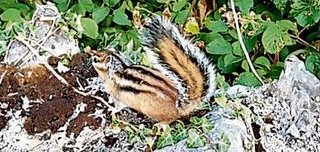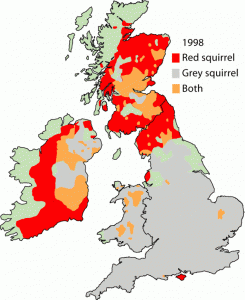
September 24, 2010

Wildlife Experts have issued an “invasive species alert” following sightings of Siberian chipmunks [one pictured above] on the loose in Co Waterford. The striped rodents, native to northern Asia, are regarded as a “significant threat” to the survival of the Irish red squirrel [below], which is already imperilled by the grey squirrel [see map at end].
Colette O’Flynn, manager of the National Invasive Species Database, explained that “Co Waterford remains a stronghold for red squirrels as the invasive grey squirrel has not as yet, penetrated into the heart of the county” but the chipmunk has “similar habitats and food requirements”.
She said the authorities were “alarmed” by sightings of chipmunks last month in Colligan Woods near Dungarvan. It is believed the creatures were bought as pets and escaped or were deliberately released into the wild. The first sighting occurred on August 10th when a member of the public spotted and photographed a chipmunk crossing a road.
The sighting sparked concern among officials at the National Biodiversity Data Centre and the National Parks and Wildlife Service. There was relief three days later when a dead chipmunk was found in the area. Officials hoped the sighting was “a one off”. However, a fresh sighting occurred on August 15th when a local resident, Dina Walshe saw and photographed another chipmunk whose behaviour suggested it might have been a former pet “as it did not shy away from close human contact”.
She submitted photographs to the National Biodiversity Data Centre, which then issued the invasive species alert. The Siberian chipmunk (Eutamias sibiricus) is normally found in woodlands in northern Russia, China, Korea and Japan and is distinguished by five longitudinal stripes along its back. The rodent can grow to a length of 25cm and lives on a diet of shrubs, mushrooms, berries, birds and other small animals.
Chipmunks can spread rabies and also carry the ticks which harbour Lyme disease. In Russia, they are regarded as pests which cause widespread destruction of nut and grain crops and can also threaten ground-nesting birds.
Ms O’Flynn confirmed it was “illegal to release any non-native species into the wild in Ireland without a licence” and that it was also “cruel to release a pet into the wild”. She pointed out that “Siberian chipmunks do not make ideal pets” as they “do not suit confinement and are difficult to contain”.
She also appealed to people who spot a chipmunk in the wild to take a photograph if possible and report the sighting. Ms O’Flynn added, “during 2009 and 2010, we have seen a number of species associated with the pet trade end up in the wild in Ireland”. Irish Times

About Loren Coleman
Loren Coleman is one of the world’s leading cryptozoologists, some say “the” leading living cryptozoologist. Certainly, he is acknowledged as the current living American researcher and writer who has most popularized cryptozoology in the late 20th and early 21st centuries.
Starting his fieldwork and investigations in 1960, after traveling and trekking extensively in pursuit of cryptozoological mysteries, Coleman began writing to share his experiences in 1969. An honorary member of Ivan T. Sanderson’s Society for the Investigation of the Unexplained in the 1970s, Coleman has been bestowed with similar honorary memberships of the North Idaho College Cryptozoology Club in 1983, and in subsequent years, that of the British Columbia Scientific Cryptozoology Club, CryptoSafari International, and other international organizations. He was also a Life Member and Benefactor of the International Society of Cryptozoology (now-defunct).
Loren Coleman’s daily blog, as a member of the Cryptomundo Team, served as an ongoing avenue of communication for the ever-growing body of cryptozoo news from 2005 through 2013. He returned as an infrequent contributor beginning Halloween week of 2015.
Coleman is the founder in 2003, and current director of the International Cryptozoology Museum in Portland, Maine.
Filed under Animal Escapees, Breaking News, CryptoZoo News, Out of Place, Weird Animal News